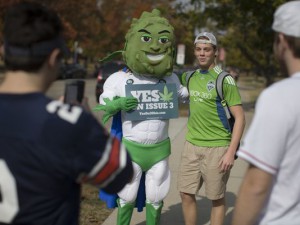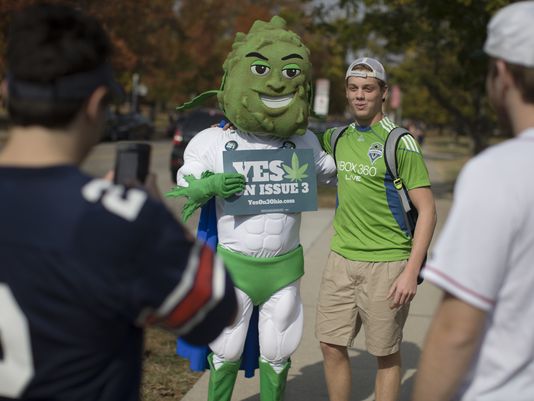ResponsibleOhio, a pro-marijuana advocacy group, rolled out a weed-themed mascot named ‘Buddie.’ The group has traveled with the mascot across the state hoping to drub up support for recreational pot. USA TODAY
2015’s Off year election turns the spotlight on key issues such as marijuana legalization, tax refunds, LGBT rights and Airbnb initiative. This post from USA Today rounds up the major decisions that have been attracting voters’ attention across the country.

(Photo: John Minchillo, AP)
Marijuana, toilets, taxes and the age-old question of humans vs. machines.
Those are just some of the issues to be decided in 2015’s off-year elections, along with the more standard topics – school boards, sheriffs and legislators.
- Voters in Ohio considered Initiative 3, which legalizes recreational and medical marijuana, but limits marijuana growing to 10 specific farms, which would be run by the private investors who funded the ballot measure. Four states permit recreational marijuana and 23 permit medical marijuana, but Ohio would become the first state to legalize pot based almost solely on business interests, rather than lifestyle, moral or medical considerations.
- In Colorado, voters decided whether to kick back $66 million in excess tax revenue from marijuana sales to taxpayers. A Colorado law requires automatic tax refunds if state revenues grow faster than expected. Prop. BB would override the law to let the state keep the money for school construction. If the measure fails, taxpayers would get refunds of $7 to $32, depending on household income.
- In Houston, voters considered Prop. 1, a measure that bans discrimination based on sexual orientation, gender identity, race, age, religion and marital status, among others. The measure came to be known as the “bathroom bill” when critics focused on a provision of the measure that would allow transgender people to use any bathroom they choose, raising concerns that men would go into women’s restrooms for nefarious purposes. The measure had been a city law, but the Texas Supreme Court this summer ordered the city to either repeal it or put the measure to a citizen vote. Apple, Dell, GE and other large companies have come out in favor of Prop. 1.
- In Tucson, voters decided whether to ban the use of red-light and speed cameras used at eight of the city’s intersections. Fans of the cameras say they decrease crashes and help ensure drivers stick to the speed limit. Opponents say having a machine issue a ticket violates an accused person’s right to face his or her accuser. Prop. 201 requires an actual police officer to issue a ticket.
- In San Francisco, voters decided Prop. F, a measure aimed squarely at services like Airbnb, the online business that helps people rent out rooms, apartments or homes to strangers via the Internet. The measure proposed restrictions on short-term rentals. Supporters of the restrictions said services like Airbnb push up rents because property owners can make more money on higher-paying short-term guests, rather than long-term tenants. Opponents of restrictions said Airbnb and other services increase options for tourists while also providing income to property owners, which helps them afford to live in the city.
Source: Voters decide on legalizing marijuana in Ohio, tax refunds in Colorado

